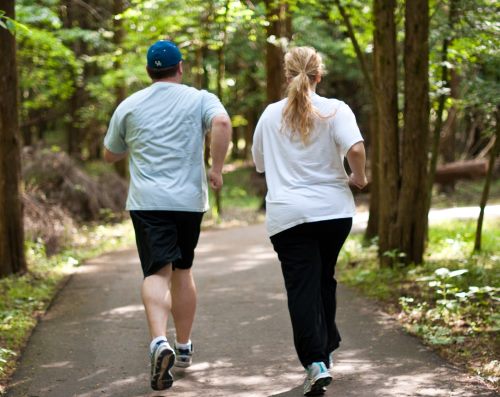You've got questions... about health and fitness!
Welcome to a special edition of our weekly Q&A posts. I noticed many of you had questions relating to issues with weight loss, fitness, and just getting healthy in general. With summer on the way and HH28 in full swing, I thought it was the perfect time to address these questions.P.S.: If you're participating in the HH28 Challenge or want more details, the first weekly Tweet Chat recap is this Sunday, June 9 (11 a.m. Eastern, 8 a.m. Pacific). Be sure to follow me @happyherbivore for details. I recommend using TweetGrid to get in on the conversation.
And if you're looking to get healthy and fit this summer, this week's meal plans come with a bonus — my Couch to 5K Program eBook! Perfect for developing good habits for meals and workouts!

Q: What is your take on pre- and post-workout snacks, timing meals around workouts, etc.? There is SO MUCH conflicting info on eating for active people, and most of it is not plant-based or whole foods/low fat!
A: I was a personal trainer and serious runner for years and this is what I can tell you: for the most part, it's all hogwash. As long as you eat well (good foods) and you don't eat right before exercise (an hour and a half before is best) you'll step up your game. The whole pre-meal/after-meal thing doesn't really matter as long as you eat a healthy plant-based diet. Your body does the math!
Q: The other day, one of my running friends asked me about amenorrhea. She said always gets it when she trains. In fact, most of the women in the group have trouble with it. I used to have trouble with it many years ago. However, I don’t recall ever having it since I went plant strong. Have you heard anything on this? Do you think being plant strong could be the reason why? BTW, my husband and I both rocked our marathon plant strong!
A: Congrats on the marathon!!
Amenorrhea is very serious and shouldn't be taken lightly. If a woman is not getting her period and she's not pregnant (and she's not on birth control that stops her period), she should be very concerned — booking an appointment at the gyno ASAP.
When your body is missing a period, it's telling you something is wrong. Amenorrhea can be cause by hormonal imbalances, being underweight or malnourished (which can happen even if you are not underweight), or it's a warning sign for another, often serious, medical issue. Regardless of the cause, amenorrhea is a signal to see your doctor ASAP.
As for the plant-based diet, I've worked with a lot of women (like Herbies of the Week, Beth and Ferrin) who corrected their menstrual issues, infertility issues, etc. with a plant-based diet, so I believe it's entirely possibly that your plant-based diet is protecting or insulating you or helping regulate you (but I'm not a doctor).
More reading:
Amenorrhea (absence of menstruation)
Nutrition Advice for Women Runners with Amenorrhea
The Running Doc Discusses Menstrual Irregularities
Amenorrhea in Olympic marathon runners
Q: My son lifts weights and has recently gone completely whole foods vegan. He lifts weights and works out a lot. He wanted to know if you could recommend some recipes from your books or other sources of protein that include at least 10g of protein or more per serving.
A: Two things:
- You don't need to eat extra protein, even if you lift weights and work out a lot. Even if he's a professional body builder, he doesn't need extra protein. He needs extra calories (more whole foods) than someone who doesn't exercise like that, but extra protein, even plant-based protein, is taxing on the body and can be harmful. Have him read this post too.
- Nutritional analysis is listed for every recipe in all my cookbooks, including protein grams, so it should be easy for him to identify which recipes have what, but this won't matter after #1 ;)
Q: Can you recommend something that I can eat more of at night — without putting on more weight?"
A: The problem with "late night eating" usually isn't the time you're eating, but what. When most people eat late at night, they're eating cookies or ice cream — not asparagus ;)
The best thing you can do is break the habit of late night snacking altogether. Our 3-Day Reboot has a great habits bootcamp that can really help you understand your habits and change them — including late night snacking. Other things you can do include having a large meal that is low in calories but exceptionally filling (like the meals on the reboot or our meal plans). If you eat a big salad and fill up on grains, potatoes, beans, and vegetables, you'll be too full to snack. It'll carry you until bed time. Drinking water or tea until bed may also help. I had a client that drank diet root beer while she watched TV. It was the only way she could avoid snacking. I don't recommend diet sodas, but Zevia is a zero-calorie beverage option that's not made with artificial sweeteners (and they have lots of cool flavors!).
Also, don't keep junk in the house. If you have to put clothes on and drive to the store at 10 p.m. to get cake and cookies you won't go. If it's in the kitchen, it'll call you. Lastly, if you absolutely must snack, pick some low-calorie options like air popped popcorn, puffed rice, cucumbers, celery, etc. If you're pushing past the celery, you're not really hungry :)
If you're desperate for sweets, slowly nibble on pieces of frozen fruit, particularly frozen peach slices or strawberries. Only grab one piece of frozen fruit at a time. Make yourself get up and go to the freezer for a refill.
Q: I have a question about calorie counting. I was wondering if you have had clients or people who have been successful with weight loss without counting (and following calorie density rules). Do you count calories? I know the meal plans have calorie counts and by doing them, a person is “counting” without having to count.
A: All my clients follow the meal plans, which are a set number of calories so even though they may not be counting calories themselves, they are doing a form of counting. I follow my own meal plans so the same is true for me. That said, we've had many Herbies of the Week who have lost weight by following a plant-based diet, and I'd be willing to bet many of them didn't count calories. My parents, for example, have lost weight since going plant-based and they don't count calories. I think calorie counting can be a helpful tool, especially when people are new to eating this way, but I don't think it's required. (Some people will eat too few calories at first when switching to a plant-based diet because they load up on vegetables which are healthy but very low in calories OR the opposite, they will eat too many calories or calorically dense foods like nuts, seeds, avocados. They think, "hey its a plant!" and eat a lot of it, when those foods should be limited during weight-loss).
If you want to attempt weight loss through a plant-based diet without calorie counting, I'd recommend completing the 3-day Reboot and 10-Day Cleanse & Immersion first. We discourage calorie counting during both programs. You won't gain weight during the reboot and cleanse and you'll feel better eating naturally as you find true hunger and balance with your body. That's one of the greatest benefits of the reboot and cleanse — you reset everything so you can listen to your body. It will tell you what it needs :) When you eat whole, natural foods, your stretch receptors and nutrient receptors can respond properly.
Lastly, I've had over 100 clients through the years and while no two people are the same, I've found that nearly all of them had to follow some kind of meal plan I created for them, or with them, to see the results they wanted. I only had one guy who pretty much did it on his own, and really, he was such a special exception (semi-professional athlete). He knew what fueled him best from years of "the game."
Q: Since transitioning to a plant-based diet, I feel weak. Is that common?
A: I'm not a doctor or a nutritionist (and it's hard to guess without seeing a food journal), but in every instance this has ever come up with a client, it was always because they were not eating enough calories and/or they were not eating enough whole grains/starches. They were eating a lot of vegetables, but vegetables are very low in calories. Make sure you're eating starches (like sweet potatoes) and whole grains (like brown rice) and plenty of them. If you need help figuring out how to eat, try the meal plans — it takes all the guesswork out.













